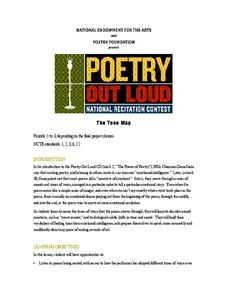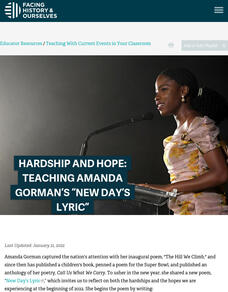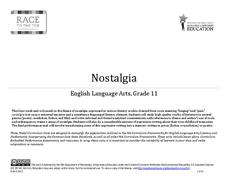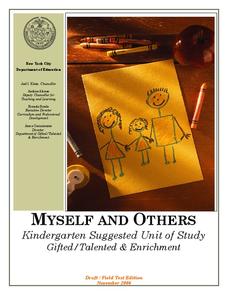Missouri Department of Elementary
Feeling Faces
A lesson help scholars identify emotions through facial expressions. After a friendly puppet reads scholars a poem all about feelings, learners act out how they would feel when a specific action happens to them. Participants watch and...
Little Stones
How Can Poetry Make People Think and Care?
Can beautiful words change the world? Literary scholars discover how to paint their visions of change using poetry in a series of three workshops. Each independent topic gives participants a chance to examine their feelings about...
Academy of American Poets
Teach This Poem: "The Shapes of Leaves" by Arthur Sze
Arthur Sze's poem, "The Shapes of Leaves," encourages young scholars to notice and speak for others who "do not speak." The lesson begins with pupils writing about a tree that they really like. The class then examines an image of...
Museum of Tolerance
Music Evokes Memories and Emotions
Dim the lights, take a deep breath, and press play to explore the emotions and memories that music elicits. Class members begin using relaxation techniques designed to create a positive listening experience. As music plays, learners...
Anti-Defamation League
Social Justice Poetry
Learners gain insight into how songs and poems express feelings of injustice. They also learn about literary devices and types of poems and make a personal connection when they write their own free verse poems about injustice.
Project B.A.S.I.C. Child Development Specialist and Child Care Consultation
Better Attitudes and Skills in Children
Little kids often have very big feelings, and need help expressing them. A set of social emotional lessons provide tangible ways for young elementary learners to visualize their emotions, focus on clear communication, and channel their...
Curated OER
The Tone Map
Poems are meant to be heard. Hearing a poem being read enriches one’s understanding of the tone and mood of the piece. Introduce your class to the sounds of poetry with a packet that not only details how to use poetry recordings in the...
Roald Dahl
George's Marvelous Medicine
Six lessons comprise a unit about Roald Dahl's George's Marvelous Medicine. Over time, scholars explore themes such as the power of words, exciting writing, and mixed feelings. They examine the writing's literary devices, persuasive...
Curated OER
Creative Writing: Haiku
Haikus by Basho, Buson, Issa, and Shiki are used as models for a brief lecture on the importance of poetry in Japan's history and the structure of this poetic form. Students then go on a nature walk, record impressions, and return to the...
Facing History and Ourselves
Hardship and Hope: Teaching Amanda Gorman's "New Day's Lyric"
Class members come together to study Amanda Gorman's poem "New Day's Lyric." After a close reading of the poem, learners watch a video of Gorman reading her poem, and then craft additional lines for the poem where they offer suggestions...
Nebraska Department of Education
Social Class and Fitting In
Social classes may be explicitly defined as in a caste system or based more informally on such ideas as wealth or education. After reading and discussing an article about one woman's experience with trying to fit into a system different...
Massachusetts Department of Education
Nostalgia
To prepare for crafting their own memoir, class members examine poetry by Margaret Atwood, Billy Collins, Robert Hayden, and Claude McKay, stories by Richard Rodriquez and Willa Cather, and Barry Levinson's film Avalon. They examine how...
Illinois Department of Natural Resources
Section Two: Why is Biodiversity Important?
Explore soil, genetic traits, natural resources, and pollution in a series of lessons that focus on biodiversity. Kids complete experiments to learn more about the importance of varied genes and organisms in an ecosystem.
New York City Department of Education
Myself and Others
Self reflection is an important skill to reinforce in our children, and it's especially helpful to help them realize who they are in the context of their environment. A collection of lessons about self image and community encourage...
Bully Free Systems
Bully Free Lesson Plans—Seventh Grade
Having a hard time defining bullying with your seventh graders? Discuss the different types of behavior one would see in a bullying situation with a series of lessons, worksheets, and group activities.
Curated OER
Nonfiction Genre Mini-Unit: Persuasive Writing
Should primary graders have their own computers? Should animals be kept in captivity? Young writers learn how to develop and support a claim in this short unit on persuasive writing.
PBS
Heart to Heart
Study heart health and math in one activity. After measuring their resting heart rates by finding the pulse in their wrists, learners build a stethoscope to listen to their heart rate, and note the differences between the two methods.


















